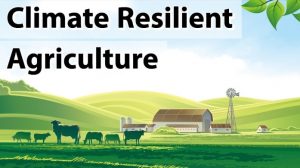Climate Resilient Agriculture:

The Union government is planning to unveil a framework to promote climate-resilient agriculture in 50,000 villages located in climatically-vulnerable districts.
- According to the Food and Agriculture Organization (FAO), climate resilient agriculture is defined as “the ability of an agricultural system to anticipate and prepare for, as well as adapt to, absorb and recover from the impacts of changes in climate and extreme weather”.
- National Innovations on Climate Resilient Agriculture (NICRA), a network project of the Indian Council of Agricultural Research (ICAR) studied the impact of climate change on agriculture and farmers.
- Studies indicate that in the absence of adaptation measures, climate change projections are likely to reduce irrigated rice yields by 3%, rainfed rice yields by 7 to 28%, wheat yield by 3.2-5.3%, maize yield by 9-10% and increased the soybean yield by 2.5-5.5% for the period 2020-2039.
- Extreme events like drought affect food and nutrient consumption, increase incidence of poverty, encourage outmigration, increase indebtedness and reduce farmers’ capacity to adapt to climate change.




